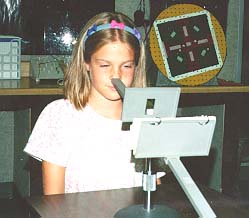Between 60% and 90% of the information comes into our
brain through the visual system. Interference in optimal
visual function will reduce the efficient processing of
visual information.
20/20 Is Not Enough!
It is estimated that 20% of children and adults have a
vision problem which interferes with optimal function. Many
measure 20/20 sight yet have an undetected vision which will
reduce their ability to achieve full potential.
Working Too Hard
Many people know how to read yet are slow or inefficient.
Others read well but have difficulty keeping their place or
with reading comprehension and memory. These people may get
good grades or perform well at their job yet do so with
great effort. This may produce either an underachievement or
overachievement syndrome.
Computers - Generators of Visual Stress
The human visual system was not designed to spend long
hours looking at a computer screen. Studies have shown that
80% of computer users experience visual stress.
Treatment for computer visual stress may include visual
stress-relieving lenses, visual-ergonomic instruction and/or
a program of Optometric Vision Therapy.
Symptoms of Visual Efficiency
Difficulty
· Average or above-average intelligence but working
too hard
· Achievement below potential
· Loss of place when reading
· Transposes words or numbers
· Headaches
· Visual fatigue
· Visual discomfort
· Short attention span
· Mind wanders when trying to concentrate
· Reduced comprehension or memory
What Should Be Done?
A comprehensive Visual Efficiency Evaluation is the only
way to determine if a visual problem is interfering with an
individual's ability to achieve to potential.
Individualized Diagnostic Approach
Our doctors combine specialized training with the most
modern equipment and techniques available to evaluate vision
as it relates to academic achievement and job-related
performance.
The comprehensive vision analysis includes an in-depth
evaluation of visual tracking, focusing, eye coordination,
and the underlying visual-perceptual and visual-integrative
abilities necessary for efficient learning.
Individualized Therapeutic Care
Written reports and personal conferences are scheduled so
that all concerned will understand the evaluation results
and treatment recommendations.
Treatment may include stress-reducing lenses, a program
of Optometric Vision Therapy and structuring the classroom
and home or work environment for maximum visual
learning.
Optometric Vision Therapy is individually designed to
meet the patient's specific visual needs. The length of the
therapy program will vary depending upon the type and
severity of the visual problem.
What is Optometric Vision Therapy?
Optometric Vision Therapy is a treatment program designed
to eliminate visual problems, reduce visual stress and
discomfort, and increase visual performance. Optometric
Vision Therapy provides the visual abilities necessary for
more efficient learning and performance in all areas of
life.
Scientific research and more than 60 years of clinical
experience have proven Vision Therapy to be extremely
effective!
Help At Any Age
Many patients in Vision Therapy are adults with symptoms
when reading or who have visual problems which make learning
more difficult. Symptoms may include loss of place, visual
fatigue, blur, headaches, reduced comprehension, and
difficulty concentrating.